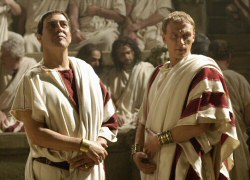TV Home / Entertainment Channel / Bullz-Eye Home
 Buy your copy from Amazon.com
Buy your copy from Amazon.com
| Rome: Season One (2005)
     Starring: Kevin McKidd, Ray Stevenson. Polly Walker, Kenneth Cranham, Tobias Menzies, Kerry Condon, Ciaran Hindis, David Bamber, Max Pirkis, Lindsay Duncan
Starring: Kevin McKidd, Ray Stevenson. Polly Walker, Kenneth Cranham, Tobias Menzies, Kerry Condon, Ciaran Hindis, David Bamber, Max Pirkis, Lindsay Duncan Director: Various Category: Drama  |



HBO and the BBC, who previously co-produced the excellent “Band of Brothers” mini-series, joined forces again for HBO’s new hour-long drama, “Rome,” which takes place in 52 B.C., during the last year of Julius Caesar’s rise to power. “Rome” features a big budget and good production values, making the show look and feel more like a film than a television show. The first episode, “The Stolen Eagle,” jumps right into the conflict brewing between Caesar (Ciaran Hindis) and his long time friend and cohort, Pompey (Kenneth Cranham). It’s a story as old as the ages – both men want power and Rome just isn’t big enough for the two of them.
But as the series goes on, the conflict between the two men is used more as a backdrop for the emerging stories of the upstanding Lucius Vorenus (Kevin McKidd) and the brutish Titus Pullo (Ray Stevenson), the only two soldiers that Caesar mentioned in his real-life journals. As both men return to Rome after several years of service in the army, they each have different challenges to face. Lucius must re-join his wife and children, who thought that he was dead, and Titus must discover his purpose in life now that his work in the army is complete. Over the course of the season, Caesar gets Lucius involved in politics, while Titus gets himself into trouble, eventually finding his way to prison and – gulp – possible execution at the hands of several gladiators.
The cast is very much an ensemble, and the women of Rome - referred to as the “shadow rulers” by the creators, due to the unseen power that they often wielded – appropriately play a major role in the events of the season. Atia (Polly Walker) and Caesar’s scorned lover, Servilia (Lindsay Duncan), have an ongoing feud, and both ladies are willing to do whatever it takes to prevail. Their children are also heavily involved in the storyline. Atia uses her son and daughter, Octavian (Max Pirkis) and Octavia (Kerry Condon), to try to gain power, pushing them both away in the process. The infamous Brutus (Tobias Menzies) is the son of Servilia, and her counsel goes a long way to convincing the Senator to take steps to bring down Caesar at the end of the season.
Meanwhile, the conflict between Pompey and Caesar builds over the course of the season until the seventh episode, “Pharsalus,” when Pompey’s time finally runs out. Caesar returns to Rome in “Triumph,” rejoicing with five days of feasting and games. The celebration in the forum is one of the iconic moments of the series, and the bonus featurette “Shot x Shot: Caesar’s Triumph” provides an in-depth look at the shooting of that particular scene, which included more than 500 extras and a slew of different visual effects. This scene is especially important in the context of the series, as it is at this moment that Caesar declares himself a god, an inflated viewpoint that ultimately leads to his undoing.
In the next episode, “The Spoils,” the friendship between Lucius and Titus is put to the test when Titus is sent into the arena to fight to the death. As the odds of Titus’ survival get longer and longer, Lucius must make a difficult choice that will no doubt affect his future as well as that of his family. This brutally violent scene is also the subject of a featurette entitled “Shot x Shot: Gladiator.” This bonus feature is especially informative given all of the digital and visual effects present in the arena battle.
Besides the “Shot x Shot” featurettes, the DVD set contains several other bonus features, including the “Rise of Rome,” a behind-the-scenes featurette covering set choices, wardrobe development and the actors’ boot camp, “When In Rome,” which discusses what we know about the culture of ancient Rome, and “Friends, Romans, Countrymen,” which introduces the characters of the series. In addition, there are eight episode audio commentaries featuring the cast and crew along with “All Roads Lead To Rome,” an onscreen guide providing even more information about ancient Rome, which was prepared by the show’s historical consultant.
“Rome” is detail-orientated and historically accurate, which are just two of the many reasons why the series is one of the best on TV. The plot and conflict slowly build throughout the season, culminating in the final episode, “Kalends of February,” which is the writers’ take on the Senators’ decision to bring Caesar down and how the devious plan was executed. Looking forward to next season, the series is going to miss the considerable presence of Julius Caesar, but the ensemble cast seems to be very capable of continuing on without him. HBO series have notoriously long hiatuses, so this DVD collection provides a fix for those looking to catch up or those wanting to take a look back.
~John Paulsen
jpaulsen@bullz-eye.com






